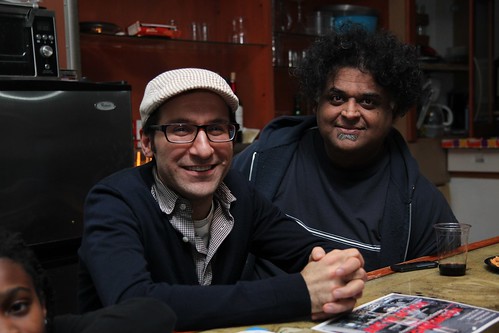
A few weeks ago, I was invited to present a film at an event called Talkies in Toronto. It was one event in a series of screenings and discussions, organized by York University humanities professor Mark Cauchi and his co-conspirator filmmaker Azed Majeed.
I thought about the choice of film for a while. In the end I suggested to Mark and Azed that I show either the controversial documentary Capturing the Friedmans, which would have allowed us to discuss many tricky issues of access and consent, or one of my own films. They decided to go for one of mine, because it would be their first documentary and the Toronto premiere of Art in Action.
Now, if you read this blog often, you’ve already heard enough about Art in Action (see previous post). So let’s talk about Talkies. The very congenial but intellectually intense event takes place in what would be a loft if it wasn’t a basement, in Toronto’s East End.
Mark explains it this way:
“The films are selected primarily by the speakers. We give them free reign to pick what they want. We figure that they’ll know best what film they can discuss in an interesting manner. This has resulted in wide variety of films being selected, from Antonioni and Godard to the 80s thriller Angel Heart to a recent film like Doubt.”
“When we conceived the series, one of the ideas was not to confine it strictly to “film studies.” So we’ve been selecting people who have expertise in certain fields or practices, who also like to work with and think about film, and who are engaging speakers. We don’t want a classroom. This means we’ve had speakers take philosophical, political, psychoanalytic, sociological, and anthropological approaches. Most have been academics, but that’s not by design as much as by circumstance. We want to get more film makers and other artists and non-academic writers to participate.”

Can you give an example or two of interesting discussions?
“Nikolas Kompridis (Professor at the Center for Citizenship & Public Policy, University of Western Sydney) gave a presentation on Antonioni’s classic, Blow-Up. He suggested that the film was challenging the modernist ethos of mastery and control (exemplified in taking pictures, technology, and swingin’ 60s consumption) by presenting its main character and its viewers with an enigma that no amount of control (exemplified in blowing up a picture) could resolve. The main character and viewer learns that instead of always attempting to control actively one’s environment, sometimes one must simply be receptive to what is beyond oneself.”
“Kristine Klement (a graduate student in Social & Political Thought at York University) and Paola Bohorquez (Instructor of English, York University) gave a co-presentation on the recent film Doubt. They highlighted the fact that there is no evidence of crime in the film, and yet characters and viewers are compelled to regard the main character of the film as guilty. Leaving aside the question of whether or not he is guilty, they used psychoanalytic theory to explore the psychological processes that lead to such discrepancies.”
“Both discussions opened up the films in interesting and unexpected ways and generated a lot of discussion and response by our viewers.”
What’s coming up?
“The next Talkies will be on Saturday February 26.
We will be screening Bruno Dumont’s 1997 debut film, The Life of Jesus. Despite the title, this film does not depict the life of Jesus, a la Pasolini’s Gospel According to Saint Matthew or Mel Gibson’s The Passion of the Christ. The film will be in French, with English subtitles.
John Caruana (Professor of Philosophy, Ryerson University) will be discussing the film. As usual, the event takes place in the basement at 245 Carlaw Ave, suite 004 (just north of Queen East), and starts at 7 pm.”
Thanks to Tobi Elliott for her help with this blog.